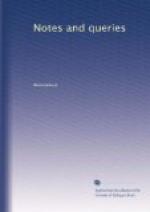Whether Robin Goodfellow and his German brother “Knecht Ruprecht” are at all connected with Robin Hood, seems very doubtful. The plants which, both in England and in Germany, are thus named, appear to belong to the elf rather than to the outlaw. The wild geranium, called “Herb Robert” in Gerarde’s time, is known in Germany as “Ruprecht’s Kraut”. “Poor Robin”, “Ragged Robin”, and “Robin in the Hose”, probably all commemorate the same “merry wanderer of the night.”
Richard John king.
* * * * *
On A passage in “The merry wives of Windsor,” And on conjectural emendation.
The late Mr. Baron Field, in his Conjectures on some Obscure and Corrupt Passages of Shakspeare, published in the “Shakspeare Society’s Papers,” vol. ii. p. 47., has the following, note on The Merry Wives of Windsor, Act ii. Sc. 2.:—
“’Falstaff. I myself sometimes having the fear of heaven on the left hand, and hiding mine honour in my necessity, am fain to shuffle, to hedge, and to lurch; and yet you, you rogue, will esconce your rags, your cat-a-mountain looks, your red-lattice phrases and your bold-beating oaths, under the shelter of your honour.’
“Pistol, to whom this was addressed, was an ensign, and therefore rags can hardly bear the ordinary interpretation. A rag is a beggarly fellow, but that will make little better sense here. Associated as the phrase is, I think it must mean rages, and I find the word used for ragings in the compound bard-rags, border-ragings or incursions, in Spenser’s Fairy Queen, ii. x. 63., and Colin Clout, v. 315.”
Having on one occasion found that a petty larceny committed on the received text of the poet, by taking away a superfluous b, made all clear, perhaps I may be allowed to restore the abstracted letter, which had only been misplaced and read brags, with, I trust, the like success? Be it remembered that Pistol, a braggadocio, is made up of brags and slang; and for that reason I would also read, with Hanmer, bull-baiting, instead of the unmeaning “bold-beating oaths.”
I well know with what extreme caution conjectural emendation is to be exercised; but I cannot consent to carry it to the excess, or to preserve a vicious reading, merely because it is warranted by the old copies.
Regretting, as I do, that Mr. Collier’s, as well as Mr. Knight’s, edition of the poet, should both be disfigured by this excess of caution, I venture to subjoin a cento from George Withers, which has been inscribed in the blank leaf of one of them.




